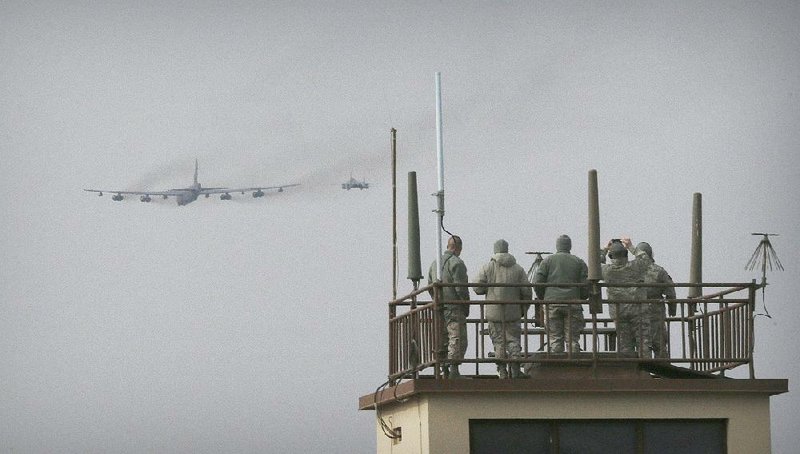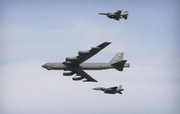UNITED NATIONS -- While the U.N. Security Council considers new sanctions on North Korea after its latest nuclear test, experts say existing sanctions are going unenforced.
Despite the mounting international concern over North Korea's nuclear capabilities, fewer than 40 of the 193 U.N. member states have turned in reports on sanctions implementation since the latest round of sanctions was imposed in 2013. Compliance has been lowest in Africa, an increasingly important market for low-cost North Korean weapons sales.
Perhaps more disturbingly, the most recent annual report published by the U.N. panel of experts on North Korea found no new instances of member states' seizure or inspection of prohibited items, although its investigations showed that the North "continues to attempt to procure or transfer items" for its nuclear and missile programs.
Since North Korea's first nuclear test in 2006, the Security Council has approved four sanctions resolutions that prohibit North Korea from possessing and trafficking weapons of mass destruction, importing luxury goods and trading in arms. That's made it trickier for the North to get hard currency to fund its nuclear and ballistic missile programs.
But the measures have failed to check the North's progress. While Pyongyang's claim to have successfully tested a hydrogen bomb Wednesday was greeted with skepticism, experts say it is likely making progress on miniaturizing a nuclear weapon and could have enough fissile material for dozens of bombs by 2020.
As expected, the Security Council, the U.N.'s most powerful body, has strongly condemned the latest test and pledged to swiftly push for "further significant measures." U.S. Ambassador Samantha Power said the council should hold North Korea accountable by imposing tough new restrictions "and by ensuring rigorous enforcement of the resolutions it has already adopted."
Diplomats said it can take a few weeks for a new draft resolution to be negotiated and put to a vote.
The council -- including veto-wielding permanent members China and Russia, which have close ties to North -- has long opposed the North's nuclear ambitions. There's been less enthusiasm, however, when it comes to agreeing on individuals and entities to be sanctioned and excluded from the international financial system.
By the end of 2015, only 32 names associated with North Korea were under sanctions, compared with 121 for Iran.
"You've got some pretty good restrictive measures," said Richard Nephew, a former top U.S. State Department official coordinating sanctions policy, "but when it comes to lists of individuals and entities where you can have some important impact on the North Korean leadership," the U.N. process has been lacking.
A U.N. diplomat familiar with the workings of the Security Council committee monitoring sanctions on North Korea said its actions require consensus by all 15 member states, which slows the process of making new designations. While Western nations basically agree on all the recommendations of the U.N. panel of experts on North Korea, other members, like China and sometimes Russia, tend to stall. The diplomat said that could give potential targets time to adapt.
The diplomat spoke on condition of anonymity because he was not authorized to speak publicly about the committee's meetings, which are not public.
A sign of how sluggish the process can be came after the most significant arms seizure to date under the North Korea sanctions, when Panama in 2013 impounded a North Korean vessel loaded with MiG-21 fighters and anti-aircraft missiles in transit from Cuba, hidden under a cargo of sugar. It took the council a whole year to add the Pyongyang-based operator, Ocean Maritime Management Company Ltd., or OMM, to its sanctions blacklist.
The panel of experts later reported on how deft North Korea is at responding to efforts to circumvent sanctions. It found that OMM had renamed most of its vessels, with 13 of its 14 ships changing owners and managers, "effectively erasing" the company from a database kept by the International Maritime Organization.
None of the ships were seized by member states, as called for by sanctions.
The panel's report, released in February, also recommended updating the sanctions list with 34 OMM entities and said all 14 vessels should be subject to sanctions. But according to the latest U.N. sanctions list dated Dec. 30, there have been no additions since July 2014.
William Newcomb, a former panel member, said that China uses the sanctions committee's consensus rule "to renege on what it agreed to do in the Security Council as well as to block proposed designations."
The news is not all bad. Experts said China has become more responsive to panel inquiries, which it used to ignore.
Joseph DeThomas, a former senior State Department official who advised on Iran and North Korea, said the U.N. sanctions, combined with unilateral U.S. sanctions, have made it harder for North Korea to move money through the international banking system. They also have helped in detecting and intercepting some illicit arms shipments.
"There are still loopholes, interpretations, problems. Those involve third-country brokers, North Korean front companies and lax inspection procedure or other problems in particular ports. But they are having an impact," he said.
The U.N. panel last year reported that a "lack of awareness and understanding" of the sanctions resolutions has allowed North Korea to exploit long-standing relationships with African countries for arms-related services and training.
Kim praises scientists
Kim looked today to milk his country's nuclear test as a propaganda victory, praising his scientists and vowing more nuclear bombs a day after the U.S. flew a powerful nuclear-capable warplane close to the North in a show of force.
The United States on Sunday flew a B-52 long-distance bomber over South Korea in a show of force after North Korea's fourth nuclear test, the U.S. and South Korea militaries confirmed.
Also today, Kim took photos with nuclear scientists and technicians involved in the nuclear test and praised them for "having glorified" his two predecessors, his late father, Kim Jong Il, and his grandfather, state founder Kim Il Sung, according to the state-run Korean Central news Agency.
Kim earlier called the explosion "a self-defensive step" meant to protect the region "from the danger of nuclear war caused by the U.S.-led imperialists," a separate KCNA dispatch said.
The comments provide insight into North Korea's long-running argument that it is the presence of tens of thousands of U.S. troops in South Korea and Japan and a "hostile" U.S. policy that justify its pursuit of nuclear weapons and long-range missiles.
The U.S.' bomber, which took off from the U.S. Air Force base in Guam, arrived over Osan Air Base south of Seoul, the South Korean capital, on Sunday to conduct training missions with U.S. and South Korean warplanes, both countries' militaries announced. The bomber returned to Guam after the exercise.
White House chief of staff Denis McDonough said the B-52 flight was intended to underscore to South Korean allies "the deep and enduring alliance that we have with them." Interviewed on CNN's State of the Union, McDonough said the U.S. would work with South Korea, Japan, China and Russia "to deeply isolate the North Koreans" and "squeeze" them until they live up to prior commitments to get rid of their nuclear weapons.
"That's the baseline requirement they have to rejoin the international community," McDonough said. "Until they do it, they'll remain where they are which is an outcast -- unable to provide for their own people."
Washington has often dispatched B-52 and B-2 bombers to South Korea. It usually does not publicize their training missions, but such flyovers by nuclear-capable bombers have always drawn harsh criticism from North Korea.
But during military standoffs, as when North Korea raised tensions in early 2013 after its third nuclear test, Seoul and Washington have made the gesture of announcing their missions to demonstrate U.S. resolve toward defending South Korea and to help calm jitters.
Earlier Sunday, the North's official Korean Central News Agency reported that Kim visited the Ministry of Korean People's Armed Forces and ordered it to increase military readiness.
And over the weekend, North Korea mobilized a large crowd in Pyongyang, the capital, to celebrate what it called its "H-bomb of justice." Speaking at the rally, a top North Korean ruling party official said the South Korean propaganda broadcasts were pushing the Korean Peninsula "toward the brink of war." The official added that the South was "jealous" of the North's successful hydrogen bomb test.
North Korea frequently resorts to brinkmanship and tough talk in dealing with its foes. Officials in South Korea suspected that Kim was using his latest nuclear test to glorify his rule and may further raise tensions to consolidate loyalty at home.
Information for this article was contributed by Cara Anna, Matthew Pennington, Edith M. Lederer, Foster Klug and Ahn Young-Joon of The Associated Press and by Choe Sang-Hun of The New York Times.
A Section on 01/11/2016



